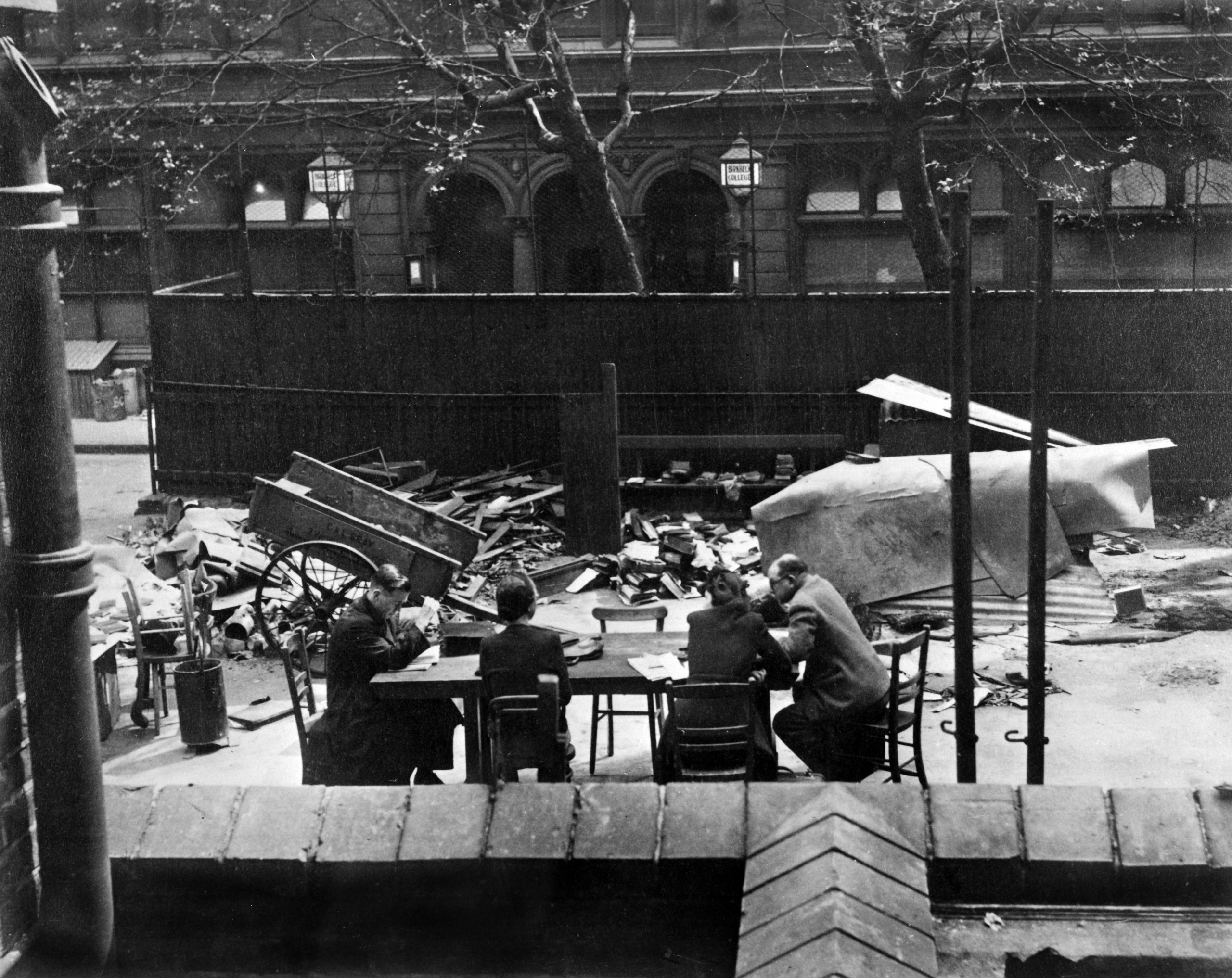Professor Jerry White, Professor of Modern London History at Birkbeck recounts how the College faired during the Second World War. This blog is part of the 200th-anniversary series, marking the founding of the College and the 75th anniversary of Victory in Europe Day.

Bomb damage to Birkbeck Library. The area around Birkbeck College was bombed during the air-raid of 10-11 May 1941. The resultant fire destroyed the Library. Image courtesy of Birkbeck History collection.
Most of London University shut down on the declaration of war in September 1939. The headquarters at Senate House was taken over by the Ministry of Information and most colleges were evacuated (like much of the BBC, many government departments and most of London’s hospitals) to areas thought to be less vulnerable to bombing. University College shifted to Aberystwyth and elsewhere in Wales, King’s to Bristol, LSE and Bedford to Cambridge, and so on. Birkbeck, its London roots deeper than any of its sister colleges and so unable to be useful to Londoners if sent to the country, resolved to close on the outbreak of war and for a time did so. But the war failed to open with a bang and in the absence of air attack, or apparently any likelihood of bombing for the immediate future, Birkbeck reopened at the end of October 1939. Indeed, it didn’t merely reopen but expanded its offer: for the first time, extensive daytime teaching was made available for those London students unable to follow their chosen university colleges out of the capital. And despite the blackout, a wide range of evening teaching also resumed.
Birkbeck was not yet at its present Bloomsbury site. That building contract had been let but work had to stop in July 1939 because of the uncertain international situation – contractors were given more pressing projects to work on, both civil defence and industrial – and in fact the new college would not be completed and occupied till 1951. So Birkbeck was still in its late-Victorian location in Breams and Rolls Buildings, straddling the City and Holborn boundary west of Fetter Lane, incidentally sharing a party wall with the Daily Mirror building. It had some near misses during the main blitz of 1940-41 and narrowly escaped total destruction in the great City fire raid of 29 December 1940, which opened a view – never before seen – of St Paul’s from the college windows. From that time on all places of work had to arrange a fireguard of staff to be in the building at night time to deal with incendiaries and raise the fire brigade if necessary. There followed nearly three-and-a-half years of relative quiet, with sporadic bombing of London and the Baby Blitz of early 1944 rarely troubling the college and its work. But Birkbeck would nearly meet its nemesis from a V1 flying bomb (or doodle-bug) at 3.07am on 19 July 1944.
Dr A. Graham was a member of the college fireguard that night, on the 1-3am watch.
I wakened Jackson [the College accountant] to do the 3-5am spell…. We were saying a few words to one another when we heard The Daily Mirror alarm go. Suddenly the bomb, which had merely been a near one until that second … dived without its engine stopping. Its noise increased enormously; Jackson and I looked at one another in silence; and I remember wondering what was going to happen next. What did happen was all over before we realised it had happened … a gigantic roar from the engine of the bomb, not the noise of an explosion, but a vast clattering of material falling and breaking, a great puff of blast and soot all over the room, and then utter quiet. Massey [another fire watcher] raised his head from the bed where he had been asleep and asked what all that was….
As the dust settled Graham climbed over the flattened metal doors of the College and went into the street. The first thing he heard was footsteps coming at a run up Breams Buildings. It was a Metropolitan police constable: ‘he called backwards into the darkness… “It’s all right, George, it’s in the City”’; satisfying himself there were no urgent casualties he promptly disappeared. Troup Horne, the College secretary from 1919-1952, was also one of the fireguard but, not wanted till 5am, was in a makeshift bed in his office: ‘At 3.06am I was awakened by a doodle overhead. Thinking we were for it, I pulled a sheet over my head to keep the plaster out of my remaining hairs; and five seconds later the damned thing went pop.’ Horne was found ‘covered from head to foot with soot, dust, and thousands of fragments of broken glass and other bits scattered from the partition which separated the general office from his room.’ His chief assistant, Phyllis Costello, was also sleeping in the College that night and was frequently part of the fireguard. She rushed to see if he was injured and was greeted by Horne instructing, ‘Cancel the window-cleaning contract’.
Indeed, there were no windows left anywhere in the College. For some time after, a witticism coined in Fleet Street during the main Blitz, was Birkbeck’s watchword: ‘We have no panes, dear mother, now.’*
*Edward Farmer (1809?-1876), ‘The Collier’s Dying Child’: ‘I have no pain, dear mother, now.’ All the information used here comes from E.H. Warmington, A History of Birkbeck College University of London During the Second World War 1939-1945, published by Birkbeck in 1954.
